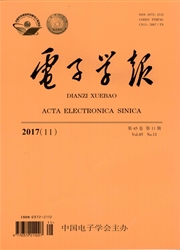

 中文摘要:
中文摘要:
变正则因子技术是提高仿射投影自适应算法性能的重要方法之一.由于环境噪声的影响,现有的变正则因子自适应算法收敛速度较慢且稳态误差较大,各种测量、评估误差的存在进一步恶化了算法性能.为提高自适应算法的跟踪性能,本文在分析无噪先验错误矢量、无噪后验错误矢量和额外均方错误间关系的基础上,提出通过最小化无噪后验错误矢量信号能量来推导自适应变正则因子表达式的方法.在实践应用中,该方法利用了测量噪声的统计方差特性,并提出一种更加光滑且更加容易控制的指数缩放因子评估方法.系统辨识的仿真结果表明本文方法与传统的变正则因子方法以及变步长方法相比有更快的收敛速度与更低的稳态误差.
 英文摘要:
英文摘要:
Variable regularization( VR) parameter technique is an important method to improve the tracking performance of affine projection adaptive filtering algorithm. Existing VR algorithms suffer from environmental noise and estimation errors,making it slow to converge and have a large steady-state error. Based on the analysis of the relationships betw een noise-free a priori error vector,noise-free a posterior error vector and excess mean-square error,a novel VR method via minimizing energy of the noise-free a posterior error vector is proposed to improve the tracking performance. The statistical variance of the measurement noise and a smoother and more easily-controlled exponential scaling factor estimation method are used for practical implementation. Reduced steady-state misalignment and improved convergence speed as compared to conventional algorithms are demonstrated by simulations in system identification scenarios.
 同期刊论文项目
同期刊论文项目
 同项目期刊论文
同项目期刊论文
 期刊信息
期刊信息
